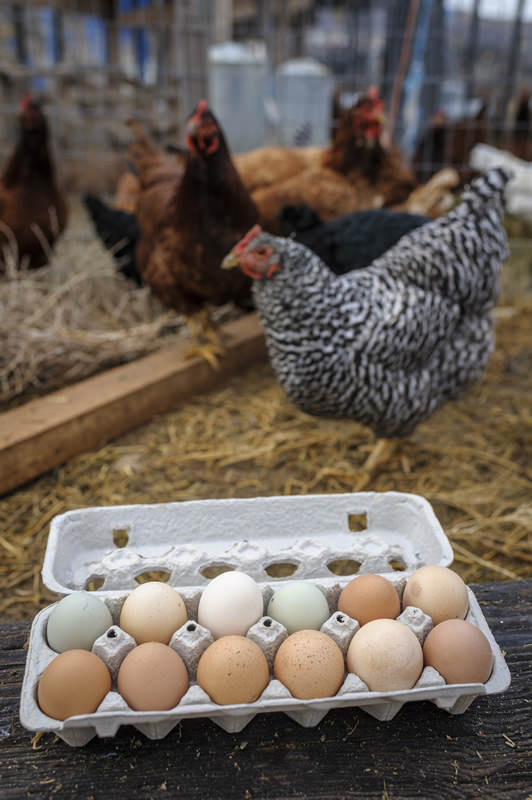cover story
INCREDIBLE EDIBLE EGGS
Cracking open the local market in Reno-Tahoe.
WRITTEN BY CHRISTINA NELLEMANN
A rooster perches atop the fence at Wix farms in Reno. Photo by Candice Vivien
Widely used in cooking but rarely contemplated, the egg perhaps is the most fundamental ingredient that exists. Still, comparing a freshly laid, free-range egg to a typical store-bought egg is like comparing Dwayne “The Rock” Johnson to Pee-wee Herman. There’s simply no competition. The common white egg found in your nearby big-box store is an anemic ghost compared to the nutrient-dense eggs laid by hens found on local farms, where the birds have access to everything from compost worms to fluffy alfalfa.
There seems to be no other food or ingredient with as long a history as the egg. According to the Encyclopedia of Food and Culture by Solomon H. Katz, jungle fowl eggs were gathered and eaten in India as early as 3200 B.C. Early humans consumed eggs from a variety of birds including gulls, pigeons, partridges, and peahens because they were easy to find, gather, and store. Domesticated fowl have a lengthy history with humans as well; Egyptians in 1400 B.C. raised birds for their eggs to be used in early baked goods.
Contemporary eggs normally take the form of the product from the Gallus gallus domesticus, or chicken. However, more people are becoming familiar with exotic eggs from quail, turkeys, and ducks. While these eggs differ widely in size and color, they each have the same basic structure: The yolk, which when fertilized becomes the bird embryo; the albumen (white); various membranes; and ropey chalazae all are protected by a calcium-rich shell with its own natural protection — the bloom. When an egg is washed, the bloom comes off and the egg must be refrigerated to protect the interior from bacteria.
A typical chicken egg has about six grams of protein and contains iron and minerals such as lutein and zeaxanthin for retinal health. The yolk provides choline, essential for liver function, cell activity, and the development of infant memory function. Each egg is about 70 calories and contains no sugar or carbs — unlike other popular breakfast foods.
Additionally, few basic ingredients are as multitalented as the egg. It’s used in nearly every type of recipe from brioche and frittata to meatloaf and chocolate cake. Rich egg yolks are the building block of mayonnaise, and egg whites whipped into a frenzy form the fluffy white peaks of meringue. Leaving eggs out of cooking is like leaving the house without your shoes.
However, this incredible little food still is delicate and prone to breaking. The birds also have their quirks.
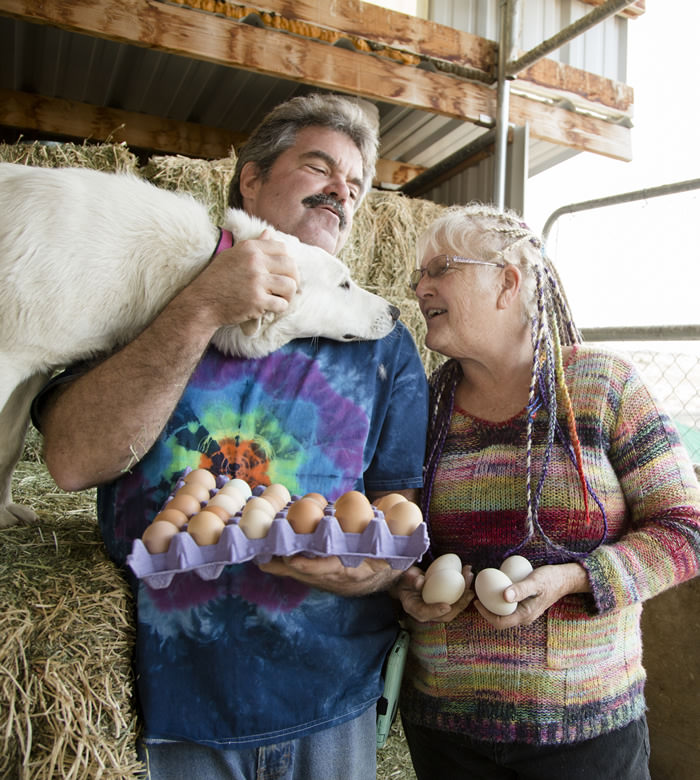
Chuck and Paula Blower, owners of Palomino Valley Chicken & Eggs in Reno. Photo by Jen Britton
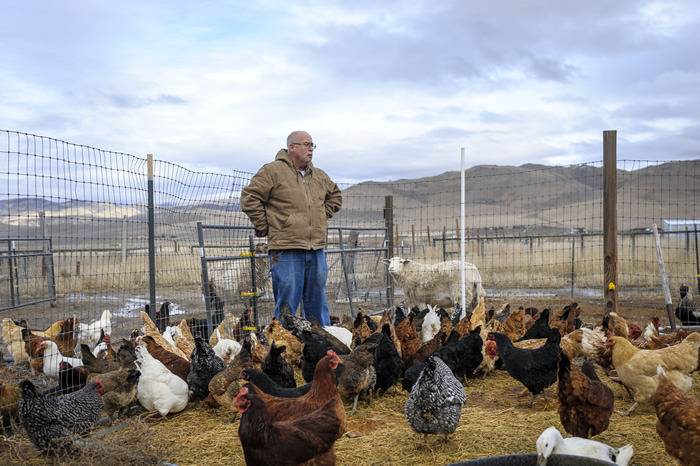
Ron Wix, owner of Wix Farms in Reno, feeds his 200 chickens. Photo by Candice Vivien
Flying the coop
“The other day when I was collecting eggs, I had about 20 tucked into my pulled-up shirt. I was just about to step out of the chicken coop door when a chicken flew up onto my head,” says Solomon Sweeting, who owns Sweeting Ranch with his wife, Bronwyn Olsen. “I was so startled, I fell out the door and into the water container. All the eggs busted, and the neighbors happened to be out on their horses watching me.”
Another time, Sweeting tucked a few eggs into his sweater pocket and forgot about them. He went the entire day without breaking them — proving that eggs can be tougher than they look.
Sweeting Ranch is located on 60 acres in Loyalton, Calif. Sweeting, Olsen, and their daughters, Sierra and Mariah Sweeting, currently have about 100 hens and want to double or triple their number of birds this year. The flock includes red and black sex-links, Australorps, Leghorns, Barred Rocks, and Rhode Island reds. The birds lay a variety of colored eggs, from pure white to dark chocolate brown, and the hens are moved around the ranch so they can access different plants and bugs. The ranch provides eggs for the Great Basin Community Food Co-op and 4th St. Bistro in Reno, and the Graeagle Store in Graeagle, Calif. Along with raising beef and lamb, and growing vegetables, Sweeting sells eggs at the Loyalton Farmers’ Market.
Sierra, 21, and Mariah, 18, were both raised around chickens and fresh eggs, and they incorporate them into their everyday lives with quiches, frittatas, and baked goods.
“Raising the baby chicks was my favorite part,” Mariah says. “When we were younger we would pick out some of the prettiest birds and got really attached to them. I’m a vegetarian now, but I still eat a lot of eggs for protein.”
“From what I can see, local chickens are raised much more humanely,” Sierra says. “They are out running around eating bugs and living a happy life. I think this really affects the taste of the eggs.”
Sierra suggests raising the birds in an environment closer to their natural habitat and away from industrial stressors.
“As long as our birds are happy, they are laying,” Solomon says. “Buying local eggs not only supports local farmers, but you are getting a better, fresher egg. Sometimes we are delivering same-day eggs to the store. You also are using a much smaller carbon footprint for your food.”
Olsen is the primary caretaker of the family’s chickens.
“We are super passionate about our eggs and our chickens,” Olsen says. “I love all the breeds, and I enjoy watching their different behaviors. They all forage differently and go for different things. They are just fascinating.”

The gold star hybrid ducks at Palomino Valley Chicken & Ducks are organically raised. Photo by Jen Britton
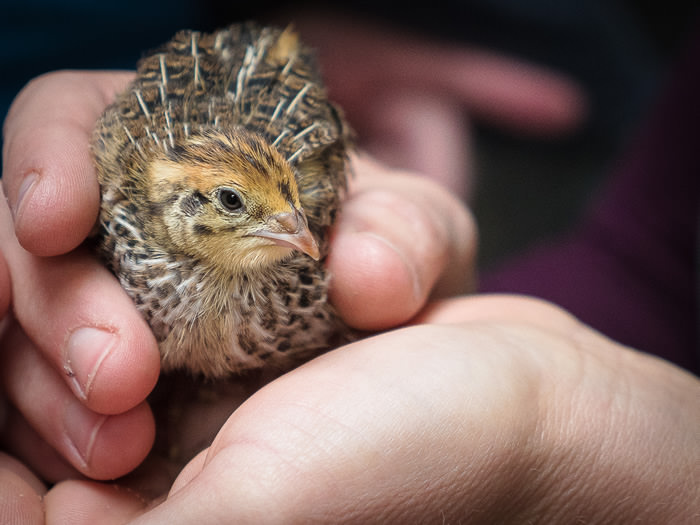
A Japanese quail from Rusty Skillet Ranch in Reno. Photo by Bob Conrad
Birds of a feather
Ron Wix of Wix Farms, north of Stead, also is so passionate about his own chickens that he has accumulated more than 250 of them in his retirement years. Wix regularly delivers the blue-green Ameraucana, light-brown Wyandotte, buff Orpington, and Barred Rock eggs to regular customers and sells them from a booth at the summer farmers’ market on California Avenue in Reno. In the winter, Wix Farms will sell eggs at the former Garden Shop Nursery location on Mayberry Drive in Reno. Wix Farms also offers locally raised beef, pork, and vegetables.
Wix’s birds are free range and eat leftover vegetable scraps, and the farm uses no chemicals, antibiotics, hormones, or GMO products. The happy hens also share their space with a few ducks and some turkeys. Wix sometimes will have turkey eggs available for sale in the spring, and the spotted ova are reportedly creamier tasting than chicken eggs.
“Turkey eggs don’t have as much protein as duck eggs,” Wix says. “So if you have issues with protein, you can eat turkey eggs. The birds can be a pain, though. They fly out of their pen, wander around, and then eventually fly back.”
Egg-cellent offerings
Wellington, Nev. farmers Nancy and Matt Ogan and their four children also specialize in chicken eggs. In addition, they have dabbled in raising geese and guinea hens.
“Unfortunately, geese don’t lay very much,” Nancy says. “At one time, I did have guinea hen eggs. I had a customer whose son was allergic to eggs, but she tested the guinea eggs on him and he could eat those.”
Guinea fowl, originally from Africa, tend to want more freedom and escape easily from pens. But they do make excellent watchdogs, and their high-pitched calls will warn of strangers or coyotes. They lay seasonal, thick-shelled eggs that are smaller than chicken eggs.
“My son made a nine-guinea-hen-egg omelet one time,” Nancy says.
Along with two geese and six guinea hens, the Ogans have about 150 chickens that produce roughly 80 eggs per day. They are free range and exist on a diet of alfalfa and organic feed from Bar ALE in Northern California. The Ogans keep track of how old their hens are by the egg color; each year they order chicks of one breed that lay a specific color. The eggs are delivered directly to customers in the Wellington and Carson City areas.
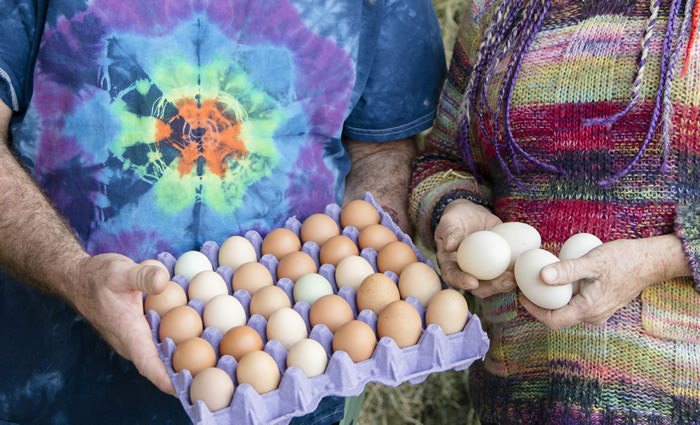
Eggs from Palomino Valley Chicken & Eggs. Photo by Jen Britton
Breaking into the business
Egg production in the Reno-Tahoe area is an excellent example of a scalable business model. Both small and large farms can adjust the amount of production with a relatively small investment. Palomino Valley Chicken & Eggs north of Reno has expanded its egg business to include about 1,400 chickens (primarily golden comets) that lay about 700 eggs per day. Owners Chuck and Paula Blower deliver their eggs to the Great Basin Community Food Co-op in Reno and restaurants such as Campo, Wild River Grille, chez louie, and Bistro 7 in Reno, and The Union in Carson City.
“People buy our eggs because they know our humane practices,” Chuck says. “The birds have access to lots of space, fresh air, and as much sun as they want. If our customers run out of our eggs and replenish at a big-box store, right away they buy our eggs again.”
With such a large egg farm, there are bound to be a few ugly ducklings.
“I’m not sure where they came from, but at one time we found some strange eggs that were rough and bumpy,” Chuck says. “We delivered them to a restaurant only to see them the next time sitting on a counter with ‘dinosaur egg’ written on them in Sharpie.”
The Blowers’ gold star hybrid and Muscovy ducks are not ugly ducklings at all. Both colorful breeds have their own pens complete with small ponds and enjoy plenty of sunshine. The gold star hybrids lay all year long and produce hefty, light-brown eggs that can be used in cooking, just like chicken eggs. Duck eggs do have more protein in the albumen, and, overall, duck eggs have more fat and cholesterol than chicken eggs. They also store longer than chicken eggs due to their thicker shells and will stay fresh up to six weeks in a refrigerator.
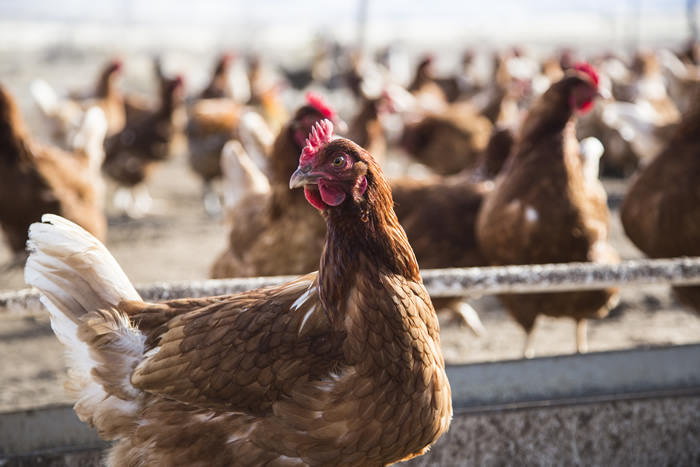
Palomino Valley Chicken & Eggs. Photo by Jen Britton
Tiny treasures
In comparison to chicken, duck, and turkey eggs, quail eggs look like delicate babies, but these little eggs pack more punch than you’d think. Most people only see the spotted eggs at their local sushi restaurants, but they are quickly showing up in natural food stores and restaurants.
Jaci and Joe Chambers of Rusty Skillet Ranch & Quail Farm raise about 150 Japanese quail on their 72-acre, off-grid property near Antelope Valley and sell eggs to Reno restaurants and bars such as Campo, Beaujolais Bistro, Chapel Tavern, and Liberty Food & Wine Exchange. Their eggs also are available at the Great Basin Community Food Co-op.
A cold-hardy Japanese quail is about the size of an Idaho potato and nearly the same color. Its mottled feathers blend seamlessly into the desert ground, and its gentle cooing is not as clamorous as that of other birds. The birds’ quick growth also is appealing to farmers; the chicks hatch in 18 days and are fully feathered in about four weeks. The Chambers’ flock receives a diet of wild quail seed mixed with millet and mealworms.
“They are so cool,” Jaci says. “I like them better than my chickens.”
Their eggs also are cool. They have high concentrations of vitamin A and hepatoprotective properties for a healthy liver. Also, studies done on diabetics revealed that regular consumption of quail eggs can reduce blood sugar and the risk of renal failure. Because the tiny eggs contain more yolk than white, they also taste mighty good in a scramble — you just have to use a few more of them. It takes about four to five quail eggs to match the size of a chicken egg.
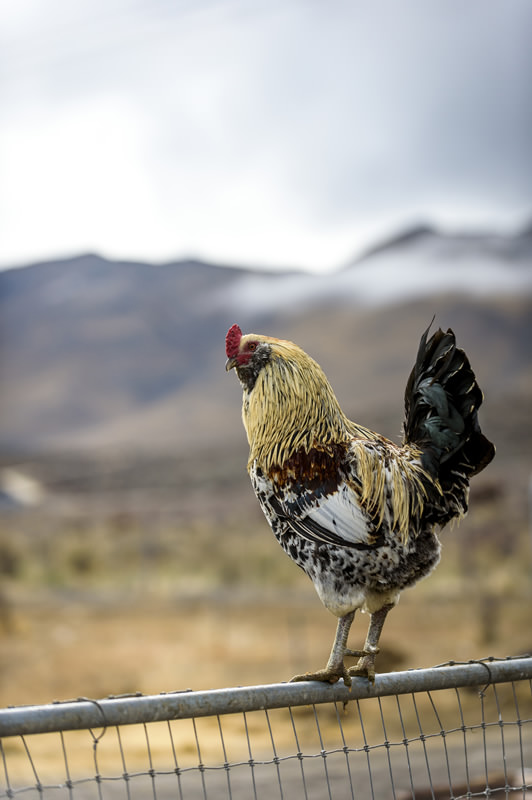
A rooster perches atop the fence at Wix farms in Reno. Photo by Candice Vivien
Emu-normous
The monster of all eggs comes from the flightless, six-foot-tall emu. Native to Australia and the second-tallest bird in the world, the emu’s deep-emerald egg dwarfs a human hand and can weigh up to two pounds. One emu egg is equal to a dozen chicken eggs. In the spring, a female emu can lay from eight to 20 of the substantial eggs, and the male actually has the tough job of sitting on them for more than 50 days. During that time, he forgoes food and water and lives off his own fat and dew from nearby plants and grass.
“There are people in Australia who put leashes on [emus] and walk them,” says David Oliveira of Silverland Emu in Fallon. “You can hug them and they will hug you back.”
Oliveira raises about 20 emus on his farm, primarily for the oil harvested from their fat pockets, which have anti-inflammatory and moisturizing properties, but Oliveira is interested in selling their eggs, chicks, and meat. The emu is the only bird with red meat. In addition, local artists lust after the gigantic eggs for craft and art projects, and the emu’s feathers are used for fishing lures, fans, and hats. Of course, the birds also attract a heck of a lot of attention to this veteran-run ranch.
“I’m a disabled vet bringing these interesting birds out to the community,” Oliveira says. “It makes me feel good that I’m raising something solid with medicinal benefits.”
Christina Nellemann is a writer and designer living in Washoe Valley and enjoys her own fresh buff Orpington and Buckeye eggs.
Where to purchase local eggs
Andelin Family Farm
8100 Pyramid Way, Sparks • 775-530-8032 • Andelinfamilyfarm.com
Bare Ranch Organic Eggs
972-800-1436 • Barerancheggs@gmail.com • Find Bare Ranch Eggs on Facebook
Bare Ranch eggs also are sold locally at Great Basin Community Co-op.
Eagle Valley Farm
Farm: 4900 River Road, Carson City
Store: 1801 E. William St., Ste. I, Carson City
775-233-4727 • Find Eagle Valley Farm on Facebook
Eagle Valley Farm eggs may be purchased at either location.
First Fruits Sustainable Farms
590 W. Williams Ave., Ste. B., Fallon • 775-427-9401 • Find First Fruits Sustainable Farms on Facebook
Girlfarm
1400 Long Valley Road, Reno • 775-221-0001 • Girlfarm.org
Great Basin Community Food Co-op
240 Court St., Reno • 775-324-6133 • Greatbasinfood.coop
Holley Family Farms
90 Quilici Road, Dayton • 775-246-1032 • Holleyfamilyfarms.com
Kruse’s Feed & Hardware
3235 Eastlake Blvd., Washoe Valley • 775-849-2077
Ogan Family Farm
Delivery to Carson City and Wellington
775-790-1293 • Oganfamilyfarm.com
Palomino Valley Chicken & Eggs
Delivery to Reno customers
500 Ironwood Road, Reno • 775-475-0144 • Find Palomino Valley Chicken & Eggs on Facebook
Rusty Skillet Ranch & Quail Farm
1225 Freds Mountain Road, Reno • 775-287-7665 • Rustyskilletranch.com
Silverland Emu
5500 Mission Road, Fallon • 617-953-6014 • Silverlandemu.com
Sweeting Ranch
400 Smith Ranch Road, Loyalton, Calif. • 530-993-4693 • Find Sweeting Ranch on Facebook
Wix Farms
15050 Frontier Road, Reno • 530-249-2021 or 775-969-3022 • Wixfarms.com
Recipes
Pickled Quail Eggs
(courtesy of Jaci Chambers, owner, Rusty Skillet Ranch & Quail Farm in Reno. Makes 1 pint-sized jar)
“This is a fun recipe to play with; you could add jalapeños or Sriracha to the mix to spice it up, or use different types of vinegar,” Chambers says.
2 cups filtered water
1 cup white vinegar
2 tablespoons salt
1 tablespoon pickling spice
¼ teaspoon sugar
¼ teaspoon sugar
½ teaspoon dried dill weed
4 cloves of garlic
18 hard-boiled and peeled quail eggs*
Peel and smash garlic. Place all ingredients except quail eggs in saucepan and simmer while stirring to dissolve salt and sugar, about 5 minutes. Place peeled eggs in pint-sized Mason jar, strain pickling juice, and pour over eggs. Place in refrigerator for at least 5 days before using to get best flavor.
*To hard-boil quail eggs, place eggs in boiling pot of water for 4 minutes; do not overcrowd. It’s best to do this in batches in a single layer. Remove to bowl of ice water for 10 minutes, or until cool to the touch, before trying to peel.
Aunt Cathy’s Chili Relleno Casserole
(courtesy of Nancy Ogan, co-owner, Ogan Family Farm in Wellington, Nev. Serves 8 to 10)
4, 7-ounce cans whole, roasted green chiles (or roast your own)
1 pound Cheddar cheese, shredded
1 pound jack or pepper jack cheese, shredded
6 farm-fresh eggs, separated
3 tablespoons flour
1 can evaporated milk or fresh cream
Salt, pepper, and cumin to taste
1 can tomato sauce
Remove seeds and flatten half of chiles to cover bottom of 13-inch baking dish. Cover with half the cheese. Layer rest of chiles and then other half of cheese. Beat egg whites until stiff. In separate bowl, beat egg yolks, milk, flour, salt, pepper, and cumin. Fold yolk mixture gently into whites, then pour over chili and cheese. Bake at 325 degrees F for 45 minutes, then pour tomato sauce over top and bake 30 minutes more. Center should be set. Remove from oven. Let cool 10 minutes.
